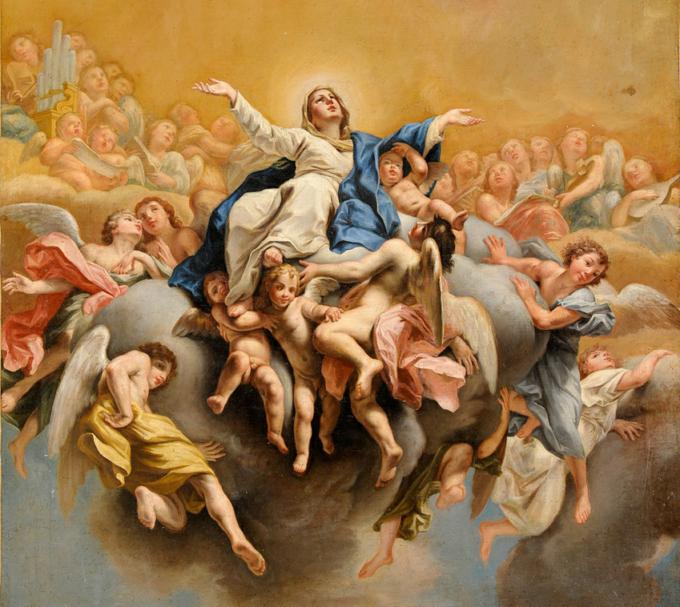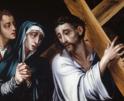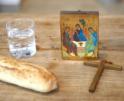
Spirituality
To appreciate the feast, it helps to approach it from the point of view of poverty -- if not actual destitution, then at least by becoming 'poor in spirit.'

Pakaluk
The old Catholic Encyclopedia, published before the dogma of the Assumption of Mary was defined by Pope Pius XII in 1950, is nonetheless edifying in what it says about the Feast which the Church celebrates on August 15th: "It is the principal feast of the Blessed Virgin." Not the Immaculate Conception; not the Feast of the Mother of God; not the Annunciation -- but rather the Assumption is "the principal" Marian celebration in the Church.
The entry tells us that in some countries it has been traditional for Catholics to fast the day before in preparation. In others, the feast is celebrated for a full week, one day being deemed not nearly enough time -- the way, I suppose, some families celebrate birthdays for days on end. In others still the celebration is repeated again 30 days after as a kind of "month's mind."
In the United States this year the feast is at least a Holy Day of obligation. Many Catholics, perhaps most, will not see the point and wonder why. They'll ignore the obligation or chafe at the hassle of it. But this column is not intended as another lament on how belief among Catholics was more robust in other times and places -- if it was -- but as an entry point into the feast.
But first, what does the feast celebrate? As Vatican II explained it: "the Immaculate Virgin, preserved free from all stain of original sin, when the course of her earthly life was finished, was taken up body and soul into heavenly glory, and exalted by the Lord as Queen over all things, so that she might be the more fully conformed to her Son, the Lord of lords and conqueror of sin and death."
The Church has left open the question of whether Mary died or not, and the cause of her death. But St. Pope John Paul II in a general audience (June 25, 1997) argued that Mary died a natural death. "The fact that the Church proclaims Mary free from original sin by a unique divine privilege does not lead to the conclusion that she also received physical immortality," he said, "The Mother is not superior to the Son who underwent death, giving it a new meaning and changing it into a means of salvation."
This sainted pope went on to say, "It is more important to look for the Blessed Virgin's spiritual attitude at the moment of her departure from this world. In this regard, St. Francis de Sales maintains that Mary's death was due to a transport of love. He speaks of a dying 'in love, from love and through love,' going so far as to say that the Mother of God died of love for her Son Jesus."
To appreciate the feast, it helps to approach it from the point of view of poverty -- if not actual destitution, then at least by becoming "poor in spirit." The reason is that the truths of the faith are meant to be the main sources of joy for us. They are so to a poor person, who has little else, and whose family life is so to speak transfigured by being seen in the light of our faith's mysteries. Our wealth leads us to find joy in earthly things in preference to heavenly things, like the rich young man.
Thus Pius XII in the opening sentence of his apostolic letter which defined the dogma wrote: "The most bountiful God, who is almighty, the plan of whose providence rests upon wisdom and love, tempers, in the secret purpose of his own mind, the sorrows of peoples and of individual men by means of joys that he interposes in their lives from time to time, in such a way that, under different conditions and in different ways, all things may work together unto good for those who love him."
In Mexico -- I know from my journeys there -- one sees a vivid and public expression of the "riches" which the poor celebrate in the glorification of Mary. Most churches have an image of Our Lady of Guadalupe with the inscription, "Non fecit talliter omni nationi," "God has not so richly blessed every nation in this way." The truth of the Assumption is similarly a gift to every Christian and every nation.
It is right, too, for us to look to Mary for comfort, protection and assistance in difficult times. Pope Pius XII appreciated this, writing in the years immediately following the Second World War: "Now, just like the present age, our pontificate is weighed down by ever so many cares, anxieties, and troubles, by reason of very severe calamities that have taken place and by reason of the fact that many have strayed away from truth and virtue. Nevertheless, we are greatly consoled to see that, while the Catholic faith is being professed publicly and vigorously, piety toward the Virgin Mother of God is flourishing and daily growing more fervent, and that almost everywhere on earth it is showing indications of a better and holier life." There is an intrinsic link between the Assumption and the virtue of holy purity especially.
Admittedly the Church and the world need a rebirth of Marian piety. Of course: conversion is always necessary in the life of a Christian and in the Church. But let this conversion begin like every other--now, here, with me, with prayer and a concrete act.
- Michael Pakaluk is Professor of Ethics and Social Philosophy in the Busch School of Business at The Catholic University of America. His book on the gospel of Mark, ‘‘The Memoirs of St. Peter,’’ is available from Regnery Gateway.
Recent articles in the Spirituality section
-
He saw the cloths and believedBishop Robert Barron
-
God's instrument for viewing the crucifixionMichael Pakaluk
-
QuinquagesimaMichael Pakaluk
-
Pro-life Christians: Now is the time to shout from the rooftopsBishop Robert Barron
-
Seeking an indulgence as an act of faithMichael Pakaluk


















